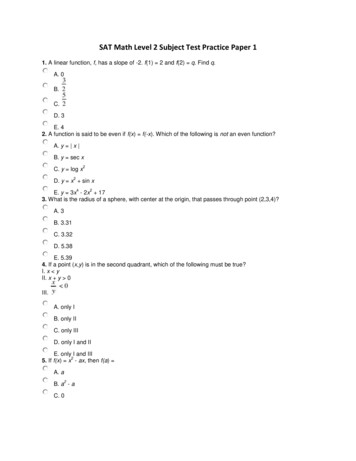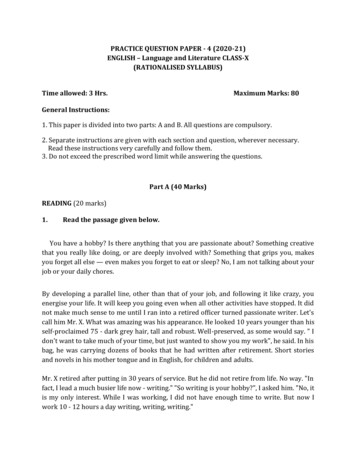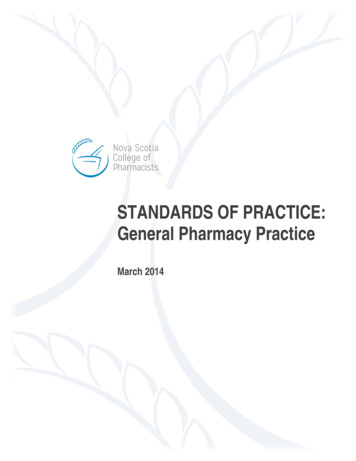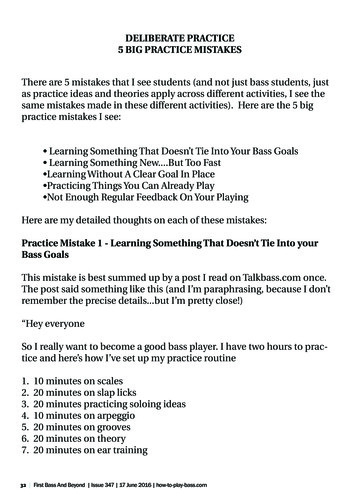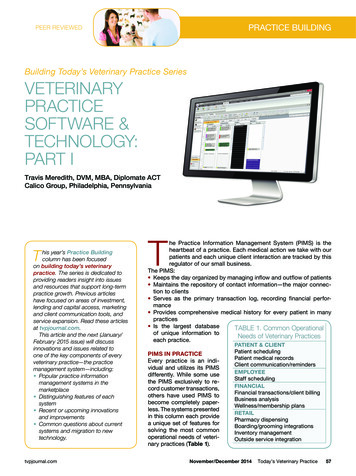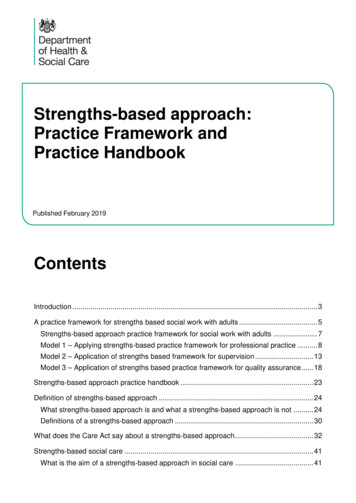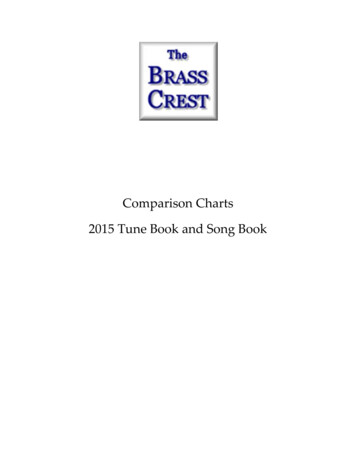
Transcription
GREPractice Bookfor the Paper-basedGRE revisedGeneral Test Second Edition19587www.ets.org/gre
Note to Test Takers: Keep this practice book until you receive your score report.This book contains important information about scoring. Copyright 2012 by Educational Testing Service. All rights reserved.ETS, the ETS logos, LISTENING. LEARNING. LEADING., GRE and POWERPREP are registeredtrademarks of Educational Testing Service (ETS) in the United States and other countries.SCOREITNOW! is a trademark of Educational Testing Service.
Table of ContentsOverview of the Paper-based GRE revisedGeneral Test . 3Test Structure . 3Preparing for the GRE revised General Test . 4Test-taking Strategies . 4Breaks. 5Scoring and Score Reporting . 5Introduction to the Analytical WritingMeasure . 6Analyze an Issue Task . 7Analyze an Argument Task . 10Introduction to the Verbal ReasoningMeasure . 15Verbal Reasoning Question Types . 15Reading Comprehension Questions . 15Text Completion Questions . 18Sentence Equivalence Questions . 20Introduction to the Quantitative ReasoningMeasure . 21Quantitative Reasoning Question Types . 21Quantitative Comparison Questions . 22Multiple-choice Questions—Select One AnswerChoice . 25Multiple-choice Questions—Select One or MoreAnswer Choices . 27Numeric Entry Questions . 28Data Interpretation Questions . 30Using the Calculator . 32Overview of the Paper-basedGRE revised General TestThe GRE revised General Test measures verbalreasoning, quantitative reasoning, critical thinkingand analytical writing skills—skills that have beendeveloped over a long period of time and are notrelated to a specific field of study, but are importantfor all. The GRE revised General Test featuresquestion types that reflect the kind of thinking youwill do and the skills you need to succeed in graduateand business school.This publication provides a comprehensiveoverview of each measure of the test to help you getready for test day. It is designed to help you: understand what is being testedgain familiarity with the various question typesreview test-taking strategiesbecome familiar with the calculator that will bedistributed on test day review scored Analytical Writing essay responsesand reader commentary understand scoring practice taking the testTaking the Practice Test . 33If you are planning to take the computer-basedGRE revised General Test, please visitwww.ets.org/gre/prepare for test preparationmaterials for the computer-based test.For test takers with disabilities or health-relatedneeds, visit www.ets.org/gre/disabilities for testpreparation materials.Evaluating Your Performance . 33Test StructureAdditional Test Preparation . 34The paper-based GRE revised General Test containstwo Analytical Writing sections, two Verbal Reasoningsections and two Quantitative Reasoning sections.Total testing time is approximately 3 hours and30 minutes. The directions at the beginning of eachsection specify the total number of questions in thesection and the time allowed for the section. TheAnalytical Writing sections are always presented first.Practice GRE revised General Test . 35AppendicesA – Analytical Writing Scoring Guides and ScoreLevel Descriptions. 94B – Sample Analytical Writing Topics, ScoredSample Essay Responses and ReaderCommentary . 99C – Practice Test Analytical Writing Topics,Scored Sample Essay Responses and ReaderCommentary . 108D – Interpretive Information for the VerbalReasoning and Quantitative ReasoningMeasures . 1173
Typical Paper-based GRE revisedGeneral TestMeasureNumber of QuestionsTimeAnalytical Writing Section 1 Analyze an Issue30 minutes(2 sections)Section 2 Analyze an Argument per sectionVerbal Reasoning 25 questions per section(2 sections)35 minutesper sectionQuantitativeReasoning(2 sections)40 minutesper section25 questions per sectionUnlike the previous paper-based GRE GeneralTest and the GRE Subject Tests, which use separateanswer sheets, the paper-based GRE revised GeneralTest is self-contained: you will enter all responses forthe Analytical Writing tasks and the Verbal Reasoning and Quantitative Reasoning questions in thetest book itself. Also, you are allowed to use a basichand-held calculator on the Quantitative Reasoningsections. The calculator will be provided to you at thetest site; you may not use your own calculator. Information about using the calculator to help you answerquestions appears on page 32.Preparing for the GRE revisedGeneral TestPreparation for the test will depend on the amountof time you have available and your personal preferences for how to prepare. At a minimum, before youtake the paper-based GRE revised General Test, youshould know what to expect from the test, includingthe administrative procedures, types of questions anddirections, number of questions and amount of timefor each section.The administrative procedures include registration and appointment scheduling, date, time, testcenter location, cost, score-reporting procedures andavailability of special testing arrangements. You canfind out about the administrative procedures for therevised General Test in the GRE Information andRegistration Bulletin. Information is also availableonline at www.ets.org/gre/general or by contactingETS at 1-609-771-7670 or 1-866-473-4373 (toll freefor test takers in the U.S., American Samoa, Guam,Puerto Rico, U.S. Virgin Islands and Canada).Before taking the practice revised General Test,it is important to become familiar with the contentof each of the measures. In this publication, you willfind information specific to each measure of the test.You can use this information to understand the type4of material on which you will be tested and the question types within each measure. Determine whichstrategies work best for you. Remember—you can dovery well on the test without answering every question in each section correctly.Test-taking StrategiesAnalytical Writing MeasureEveryone—even the most practiced and confident ofwriters—should spend some time preparing for theAnalytical Writing measure before arriving at thetest center. It is important to understand the skillsmeasured and how the tasks are scored. It is also useful to review the scoring guides, sample topics, scoredsample essay responses and reader commentary foreach task.The tasks in the Analytical Writing measurerelate to a broad range of subjects—from the fine artsand humanities to the social and physical sciences—but no task requires specific content knowledge. Infact, each task has been tested by actual GRE testtakers to ensure that it possesses several importantcharacteristics, including the following: GRE test takers, regardless of their field of studyor special interests, understood the task andcould easily respond to it. The task elicited the kinds of complex thinkingand persuasive writing that university facultyconsider important for success in graduateschool. The responses were varied in content and in theway the writers developed their ideas.To help you prepare for the Analytical Writing measure, the GRE Program has published the entire poolof tasks from which your test tasks will be selected.You might find it helpful to review the Issue andArgument pools. You can view the published pools atwww.ets.org/gre/awtopics.Before taking the Analytical Writing measure,review the strategies, sample topics, essay responsesand reader commentary for each task contained inthis document. Also review the scoring guides foreach task. This will give you a deeper understandingof how readers evaluate essays and the elements theyare looking for in an essay.In the paper-based revised General Test, the topicsin the Analytical Writing measure will be presentedin the test book, and you will handwrite your essayresponses in the test book in the space provided.
It is important to budget your time. Within the30-minute time limit for the Issue task, you will needto allow sufficient time to consider the issue and thespecific instructions, plan a response and composeyour essay. Within the 30-minute time limit for theArgument task, you will need to allow sufficient timeto consider the argument and the specific instructions,plan a response and compose your essay. Althoughthe GRE readers who score your essays understandthe time constraints under which you write and willconsider your response a first draft, you still want it tobe the best possible example of your writing that youcan produce under the testing conditions.Save a few minutes at the end of each section tocheck for obvious errors. Although an occasionalspelling or grammatical error will not affect yourscore, severe and persistent errors will detract fromthe overall effectiveness of your writing and loweryour score accordingly.Verbal Reasoning and Quantitative ReasoningMeasuresThe questions in the Verbal Reasoning and Quantitative Reasoning measures have a variety of formats.Some require you to select a single answer choice;others require you to select one or more answerchoices, and yet others require you to enter a numericanswer. Make sure when answering a question thatyou understand what response is required. Completeinstructions for answering each question type areincluded in the practice test after the two AnalyticalWriting tasks.When taking a Verbal Reasoning or QuantitativeReasoning section, you are free, within that section,to skip questions that you might have difficulty answering and come back to them later during the timeprovided to work on that section. Also during thattime you may change the answer to any question inthat section by erasing it completely and filling in analternative answer. Be careful not to leave any straymarks in the answer area, as they may be interpretedas incorrect responses. You can, however, safely makenotes or perform calculations on other parts of thepage. No additional scratch paper will be provided.Your Verbal Reasoning and Quantitative Reasoning scores will be determined by the number of questions for which you select or provide the best answer.Questions for which you mark no answer or moreor fewer than the requested number of answers arenot counted in scoring. Nothing is subtracted from ascore if you answer a question incorrectly. Therefore,to maximize your scores on the Verbal Reasoning andQuantitative Reasoning measures of the paper-basedtest, it is best to answer every question.Work as rapidly as you can without being careless.Since no question carries greater weight than anyother, do not waste time pondering individual questions you find extremely difficult or unfamiliar.You may want to go through a section rapidly atfirst, stopping only to answer those questions you cando so with certainty. Then go back and answer thequestions that require greater thought, concludingwith the difficult questions if you have time.Note: During the actual administration of the revisedGeneral Test, you may work only on the section thetest center supervisor designates and only for the timeallowed. You may not go back to an earlier section ofthe test after the supervisor announces, “Please stopwork” for that section. The supervisor is authorized todismiss you from the center for doing so. All answersmust be recorded in the test book.BreaksThere is a 10-minute break following the secondAnalytical Writing section.Scoring and Score ReportingAnalytical Writing MeasureFor the Analytical Writing measure, each essay receives a score from two readers using a six-pointholistic scale. In holistic scoring, readers are trainedto assign scores based on the overall quality of anessay in response to the assigned task. If the twoscores differ by more than one point on the scale,the discrepancy is adjudicated by a third GRE reader.Otherwise, the two scores on each essay are averaged.The final score on the two essays are then averaged and rounded to the nearest half-point intervalon the 0-6 score scale. A single score is reported forthe Analytical Writing measure.The primary emphasis in scoring the AnalyticalWriting measure is on your critical thinking andanalytical writing skills. Scoring guides for the Issueand Argument prompts are included in this publication in Appendix A on pages 94–97 and available atwww.ets.org/gre/scoreguides.5
Independent Intellectual ActivityScore ReportingDuring the scoring process for the GRE revisedGeneral Test, essay responses on the AnalyticalWriting measure are reviewed by ETSessay-similarity-detection software and byexperienced essay readers. In light of the high valueplaced on independent intellectual activity withingraduate schools and universities, ETS reserves theright to cancel test scores of any test taker when anessay response includes any of the following:The scores for the GRE revised General Test include: text that is unusually similar to that found inone or more other GRE essay responses quoti
Test and the GRE Subject Tests, which use separate answer sheets, the paper-based GRE revised General Test is self-contained: you will enter all responses for the Analytical Writing tasks and the Verbal Reason-ing and Quantitative Reasoning questions in the test book itself. Also, you are allowed to use a basic hand-held calculator on the Quantitative Reasoning sections. The calculator will be .

